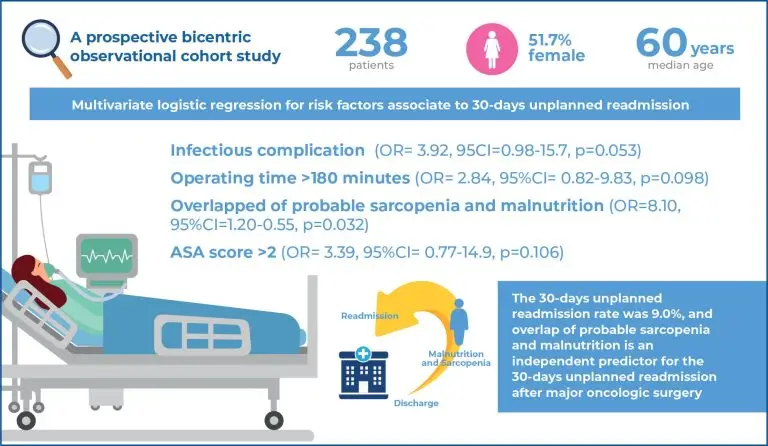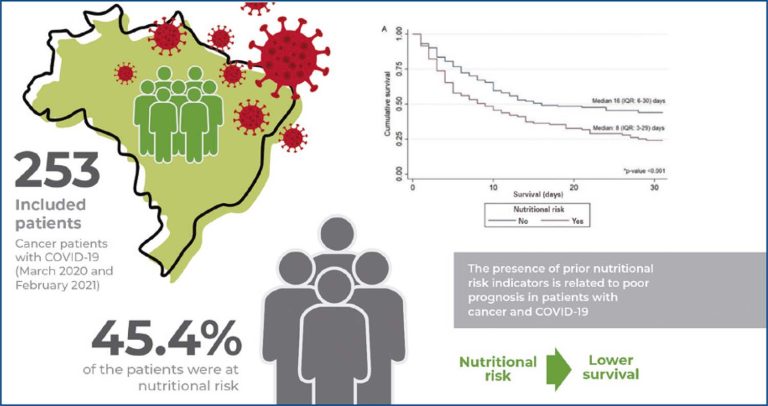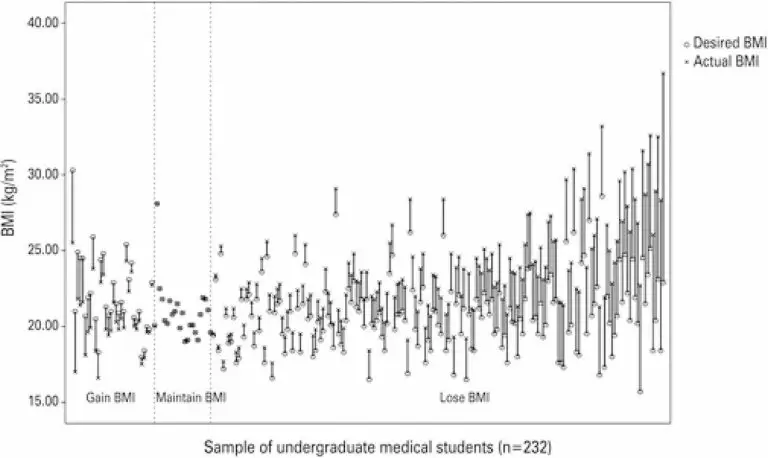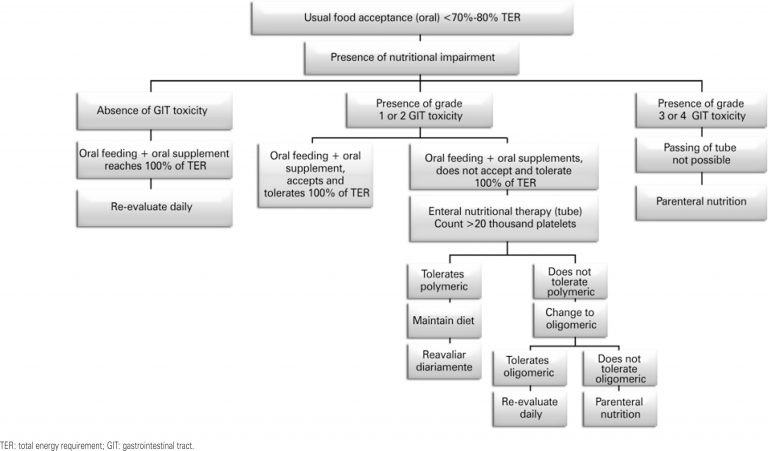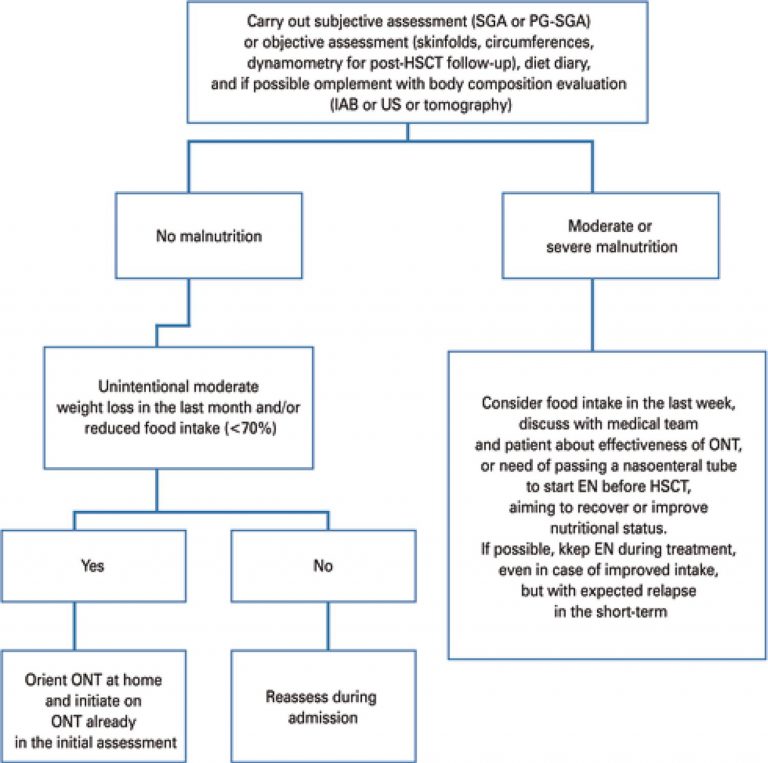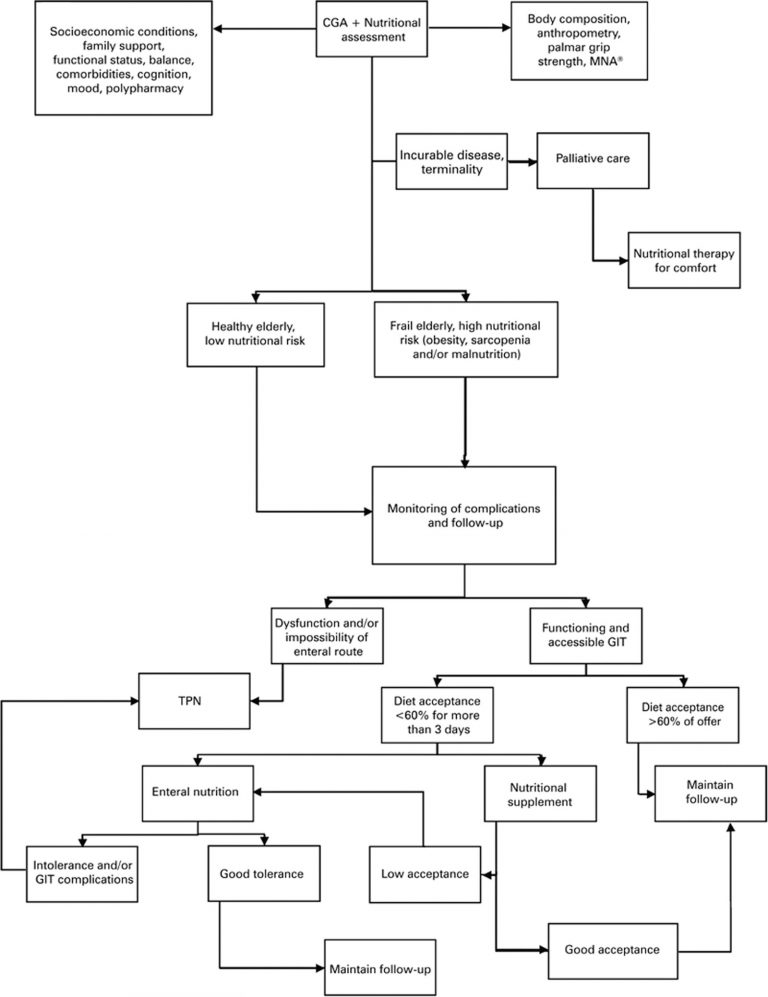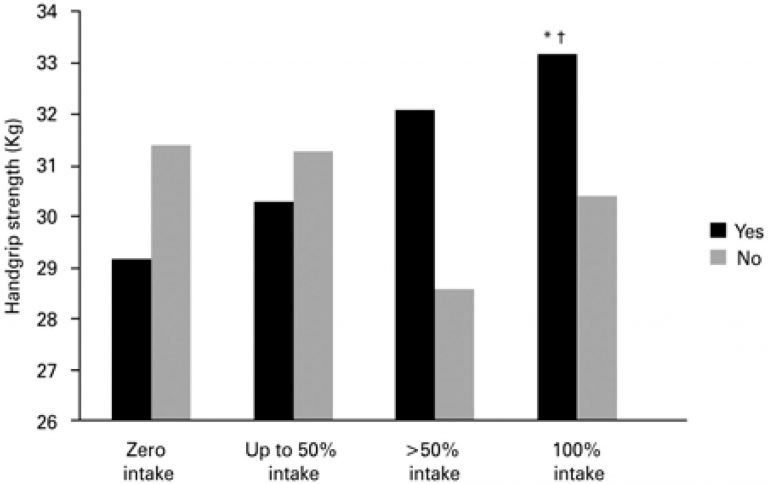07/Oct/2024
The 30-day readmission rate of patients with an overlap of probable sarcopenia and malnutrition undergoing major oncological surgery
DOI: 10.31744/einstein_journal/2024AO0733
Highlights Probable sarcopenia plus malnutrition was significantly associated with unplanned readmission. Overlap of probable sarcopenia and malnutrition was an independent risk factor for readmission. Certification of whether the patient is malnourished and/or sarcopenic preoperatively is necessary. SARC-F and subjective global assessment can effectively and easily assess sarcopenia and malnutrition at admission. ABSTRACT Objective: To assess the 30-day unplanned readmission rate and its association with overlapping probable sarcopenia and malnutrition after major oncological surgery. Methods: A prospective bicentric observational cohort study […]
Keywords: Malnutrition; Nutritional status; Patient readmission; Postoperative complications; Sarcopenia; Surgical oncology
07/Mar/2023
Cancer patients with COVID-19: does prior nutritional risk associated with cancer indicate a poor prognosis for COVID-19?
einstein (São Paulo). 07/Mar/2023;31:eAO0172.
View Article07/Mar/2023
Cancer patients with COVID-19: does prior nutritional risk associated with cancer indicate a poor prognosis for COVID-19?
DOI: 10.31744/einstein_journal/2023AO0172
Highlights Patients at nutritional risk had a lower survival than those not at nutritional risk. Nutritional risk had good discriminatory accuracy to predict death. Nutritional screening should be included as an essential part of care for these patients. ABSTRACT Objective To verify whether the presence of related nutritional risk indicators prior to COVID-19 diagnosis is associated with poor survival in patients with cancer. Methods We retrospectively analyzed the data of hospitalized cancer patients who tested positive for COVID-19 between […]
Keywords: Coronavirus; Coronavirus infections; COVID-19; Malnutrition; Neoplasms; Nutritional status; Prognosis
28/Apr/2022
Body dissatisfaction among undergraduate medical students in the city of Juiz de Fora, Minas Gerais, Brazil
DOI: 10.31744/einstein_journal/2022AO6648
ABSTRACT Objective To assess the level of body dissatisfaction among undergraduate medical students in the city of Juiz de Fora, Minas Gerais, Brazil. Methods A cross-sectional study with 232 volunteers of both sexes at a private college. The Body Shape Questionnaire was used, which is a tool based on the sum of values that allow classifying body dissatisfaction according to the following scores: less than 111, if absence of body dissatisfaction; between 111 and 138, if mild body dissatisfaction; between […]
Keywords: Body image; Feeding and eating disorders; Mental Health; Nutritional status; Students, medical
25/Nov/2021
Brazilian Nutritional Consensus in Hematopoietic Stem Cell Transplantation: children and adolescents
DOI: 10.31744/einstein_journal/2021AE5254
ABSTRACT The Brazilian Nutritional Consensus in Hematopoietic Stem Cell Transplantation: Children and Adolescents was developed by dietitians, physicians, and pediatric hematologists from 10 Brazilian reference centers in hematopoietic stem cell transplantation. The aim was to emphasize the importance of nutritional status and body composition during treatment, as well as the main characteristics related to patient´s nutritional assessment. This consensus is intended to improve and standardize nutrition therapy during hematopoietic stem cell transplantation. The consensus was approved by the Brazilian Society […]
Keywords: Adolescent; Child; Hematopoietic stem cell transplantation; Nutrition assessment; Nutrition therapy; Nutritional status; Pediatrics
21/Oct/2020
Discriminative power of an adapted version of Nutritional Risk Screening 2002 applied to Brazilian older adults
einstein (São Paulo). 21/Oct/2020;18:eAO5309.
View Article21/Oct/2020
Discriminative power of an adapted version of Nutritional Risk Screening 2002 applied to Brazilian older adults
DOI: 10.31744/einstein_journal/2020AO5309
ABSTRACT Objective: To investigate the discriminative power of Nutritional Risk Screening 2002. Methods: A cross sectional study involving one hundred participants aged ≥60 years. The original and adapted versions of Nutritional Risk Screening 2002 and the Mini Nutritional Assessment were used. Nutritional Risk Screening 2002 adaptation consisted of a lower age cutoff (60 years or older) for addition of one extra point to the final score. Results: Screening using Nutritional Risk Screening 2002 revealed higher nutritional risk among patients aged […]
Keywords: Aged; Malnutrition; Nutrition therapy; Nutritional assessment; Nutritional status
13/Apr/2020
Evaluation of nutritional risk factors in hematopoietic stem cell transplantation-eligible patients
DOI: 10.31744/einstein_journal/2020AO5075
ABSTRACT Objective To evaluate the nutritional risk factors in patients eligible for hematopoietic stem cell transplantation. Methods A cross-sectional, descriptive study conducted with patients recruited from an hematology outpatient clinic. Study variables included demographic and clinical data, patient-generated global subjective assessment findings, anthropometric indicators, food intake and oxidative stress levels. The level of significance was set at 5% (p
Keywords: Food consumption; Hematopoietic stem cells; Nutritional status; Oxidative stress; Sarcopenia; Stem cell transplantation
04/Feb/2020
Brazilian Nutritional Consensus in Hematopoietic Stem Cell Transplantation: Adults
DOI: 10.31744/einstein_journal/2020AE4530
ABSTRACT The nutritional status of patients submitted to hematopoietic stem cell transplant is considered an independent risk factor, which may influence on quality of life and tolerance to the proposed treatment. The impairment of nutritional status during hematopoietic stem cell transplant occurs mainly due to the adverse effects resulting from conditioning to which the patient is subjected. Therefore, adequate nutritional evaluation and follow-up during hematopoietic stem cell transplant are essential. To emphasize the importance of nutritional status and body composition […]
Keywords: Hematopoietic stem cell transplantation; Nutritional status; Nutritional therapy
20/Aug/2019
Dissatisfaction about body image and associated factors: a study of young undergraduate students
DOI: 10.31744/einstein_journal/2019AO4642
ABSTRACT Objective: To verify the prevalence of dissatisfaction with body image and its association with socio-demographic, economic, and anthropometric variables, as well as levels of physical activity among undergraduate students. Methods: A cross-sectional study was conducted with 348 undergraduate students at the dining hall of a public Brazilian university located in the state of Mato Grosso do Sul. Body image perception was evaluated using the Silhouette Matching Task. The other variables assessed were sex, age, marital status, housing conditions, socioeconomic […]
Keywords: Body image; Body weight; Nutritional status; Self concept; Students
23/May/2019
Brazilian Nutritional Consensus in Hematopoietic Stem Cell Transplantation: Elderly
DOI: 10.31744/einstein_journal/2019AE4340
ABSTRACT The Brazilian Nutritional Consensus in Hematopoietic Stem Cell Transplantation: Elderly was elaborated by nutritionists, nutrologists and hematologists physicians from 15 Brazilians reference centers in hematopoietic stem cell transplantation, in order to emphasize the importancy of nutritional status and the body composition during the treatment, as well as the main characteristics related to patient’s nutritional assessment. Establishing the consensus, we intended to improve and standardize the nutritional therapy during the hematopoietic stem cell transplantation. The Consensus was approved by the […]
Keywords: Aged; Hematopoietic stem cell transplantation; Nutrition assessment; Nutritional status
28/Dec/2018
Effects of overnight fasting on handgrip strength in inpatients
DOI: 10.31744/einstein_journal/2019AO4418
ABSTRACT Objective: To investigate the effects of overnight fasting on handgrip strength of adult inpatients. Methods: A prospective clinical study enrolling 221 adult patients. The endpoints were handgrip strength obtained by dynamometry in three time points (morning after an overnight fasting, after breakfast and after lunch) and the cumulative handgrip strength (mean of handgrip strength after breakfast and lunch) in the same day. The mean of three handgrip strength measures was considered to represent each time point. A cut-off for […]
Keywords: Diet; Fasting; Malnutrition; Muscle strength; Nutritional status



